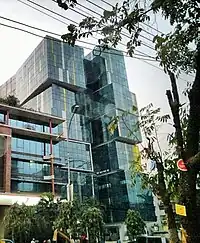Economy of Dhaka
The economy of Dhaka is the largest in the Peoples Republic of Bangladesh, contributing $213.3 billion in nominal gross state product and $740 billion in purchasing power parity terms as of 2022.[6] The economy of Dhaka contributes 40% of Bangladesh's gross domestic product. If Dhaka were a sovereign nation, it would rank as the 50th largest economy in the world and fourth largest economy in South Asia, ahead of Myanmar, Sri Lanka, Nepal, Bhutan, Maldives, Afghanistan and behind India, Bangladesh and Pakistan. Dhaka also boast the highest per capita GDP in South Asia.
| Currency | Taka |
|---|---|
| FY20-21 | |
| Statistics | |
| GDP | $213.3 Billion (nominal, 2022)[1] $740 billion (PPP, 2022)[2] |
| GDP rank | 1st |
GDP per capita | $7,712 (nominal, 2020)[3] $12,339 (PPP, 2020)[4] |
Population below poverty line | 15% |
| Unemployment | 4.8% (2020)[5] |
Average gross salary | ৳110000 (US$1,000) |
Headquarters of major Bangladeshi financial institutions as Dhaka Stock Exchange, Bangladesh Bank, as well as major companies such as BEXIMCO, Bashundhara Group, PRAN-RFL Group, Dhaka serves as the financial hub of the country. Regional headquarters of many multi-national institutions such as GlaxoSmithKline, HeidelbergCement, Reckitt Benckiser, HSBC, British American Tobacco and Nestlé are also located in Dhaka. Dhaka Stock Exchange is the largest stock exchange in Bangladesh, and second largest in South Asia with a market capitalization of $48 billion.
History
Due to its location right beside some main river routes, Dhaka was an important centre for business. Muslin fabric was produced and traded in this area.[7]
Italian traveller Niccolao Manucci came to Dhaka in 1662–63. According to him, there were only two kuthis (trading posts) – one of the English and the other of the Dutch. Ships were loaded with fine white cotton and silk fabrics.[8]

Sectors
| Top publicly traded companies in Dhaka for 2015 |
| Beximco |
| One Bank Limited |
| Al-Arafah Islami Bank Limited |
| Prime Bank Limited |
| United Airways |
| Mercantile Bank Limited |
| Beximco Pharma |
| Summit Power Limited |
The manufacture of brick in Dhaka's suburbs, which adds little to gross national product, adds significantly to PM2.5 air pollution.[9]
Environmental sector
Founded in 1996, Waste Concern is a Bangladeshi Social Business Enterprise (SBE) for waste recycling that offers solutions for waste management.[10]
International trade and other sectors
Dhaka has historically derived significant revenue from International trade, Textile, Pharmachemical and financial institutions. The exports of goods made in Dhaka totalled approximately US$10 billion in 2012, with a rapid growth in Pharmachemical, and IT with 15.68% and 7.28% growth.
References
- "Dhaka (North & South), Bangladesh". C40 Cities. Retrieved 4 August 2023.
- "PPP conversion factor, GDP (LCU per international Dollar) - Bangladesh". Retrieved 4 August 2023.
- "Dhaka, Bangladesh GDP and Income Distribution". www.canback.com. Retrieved 1 July 2020.
- "Dhaka, Bangladesh GDP and Income Distribution". www.canback.com. Retrieved 1 July 2020.
- "Asian Metropolis: Dhaka" (PDF). Urban. Retrieved 29 October 2014.
- "Dhaka (North & South), Bangladesh". C40 Cities. Retrieved 4 August 2023.
- Akter, Sayeeda (3 March 2010). "Economic life carved in history". The Daily Star. Retrieved 30 December 2015.
- Aniruddha Ray. "Manucci, Niccolao". Banglapedia. Retrieved 29 May 2015.
- Sohara Mehroze Shachi (5 September 2018). "Bangladesh's Air Pollution Problem Grows, Brick by Brick". Undark. Retrieved 7 September 2018.
The kiln operations alone — while representing just 1 percent of the country's GDP — generate nearly 60 percent of the particulate pollution in Dhaka, according to Bangladesh's Department of Environment (DOE).
- "About Waste concern". Waste Concern. Retrieved 19 February 2012.